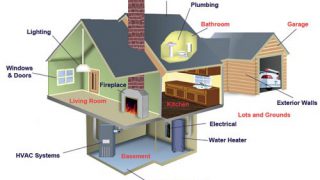A general home inspection typically is required by sellers and their lenders before closing on a house. This type of inspection typically involves inspecting both the interior and the exterior of the house. A qualified home inspector will inspect your property and examine a variety of items. Items that are inspected are typically those that can cause serious damage such as structural problems or water damage.
The purpose of a general home inspection isn’t just to be aware of present condition. It is also used as a means of preventing problems that could arise later. By reviewing the property, the inspector can identify areas in need of repair and make recommendations for future maintenance. This review can prove to be very useful for the current owner who is trying to sell the house. The seller may be able negotiate more favorable terms if they highlight the most serious issues. This is because a buyer is much more likely to be willing to purchase a home that has been properly maintained.
When it comes to selling homes, there is absolutely nothing worse than finding your property has needed extensive repairs. Although some sellers try to downplay these inspections, it is actually quite common for the majority of sellers to admit that some repairs need to be made. Most inspections are completed after the purchase agreement has been signed. Sometimes, the buyer or seller may disagree about whether repairs should be completed before closing escrow.
One area that is frequently addressed during a general home inspection are roof leaks. Although roof leaks are quite common, it is important to have a qualified inspector examine them to determine if they were caused by negligence or normal installation procedures. In some cases, the nails used in installation may be too small or not enough. These issues can be addressed by a general home inspector.
A general home inspection will also address plumbing and electrical issues. Leakages can often be found in walls. This will require a home inspector to repair the problem. In other cases, a homeowner may decide to hire a contractor to address the problem and the general home inspection report is never filed. Hiring a contractor can be an expensive investment. To ensure that future homeowners are not exposed to any dangers from the wiring or pipes, it is important to have a professional home inspector inspect these repairs.
Another issue that is often addressed in a home inspection is radon levels. Radon levels must be detected and taken corrective action if they are found. In some cases, a home inspector might conclude that radon levels do not pose any danger to occupants. If high levels are detected, however, a radon mitigation specialist should call in.
During a home inspection, the Pre Purchase Building Inspections Melbourne looks for the following conditions: roof leaks, cracks, termite infestation, visible water damage, and structural issues. In other cases, the inspector might identify potential issues, but does not recommend any repairs at this time. For instance, a home inspector might notice a crack in the ceiling or wall, but determine that it does not present a risk to anyone. If the crack is still present and has not become weaker, the homeowner might consider fixing it.
A pest inspector can help you identify areas where there are high levels of pests and advise you on how to eradicate them. They can also advise homeowners about the cost of removing or repairing the pests. A qualified pest inspection service can prove to be very beneficial. A qualified inspection service will usually be able to visit your house and give you an estimate of the cost of repairs.
